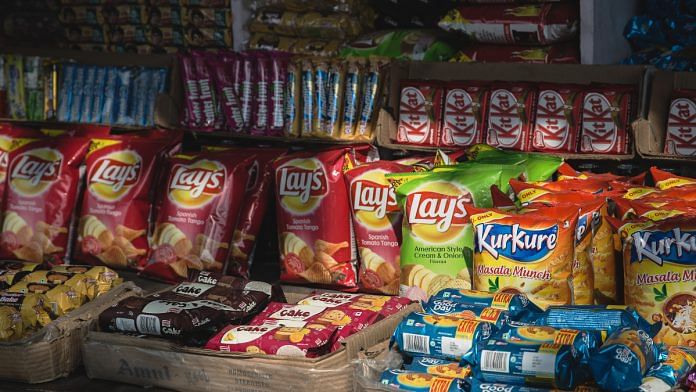Thank you dear subscribers, we are overwhelmed with your response.
Your Turn is a unique section from ThePrint featuring points of view from its subscribers. If you are a subscriber, have a point of view, please send it to us. If not, do subscribe here: https://theprint.in/subscribe/
Giant multinational food companies touted ultra-processed food (UPF) as source of healthy diet. But is it? Today’s retail world is full of UPF label claims – Fat free, Gluten free, Sugar free, Cholesterol free, 100% Organic foods and many more. But who is monitoring those claims? A growing number of studies have raised health concerns about a certain type of food that most we eat: ultra-processed foods. And yet, we are eating more and more of them. New evidence links ultra-processed foods with a range of health risks. Recent news stories have reported that eating ultra-processed food increases the risk of heart attack and stroke, based on results from two new research studies. The media coverage is based upon two studies that were presented at the 2023 European Society of Cardiology Congress on 25-28 August. Longitudinal studies in the Americas and Europe have linked eating more ultra-processed food to a number of health risks, including increases in obesity, high blood pressure, type 2 diabetes. Consuming large amounts of ultra-processed food, especially drinks containing artificial sweeteners, is associated with a higher risk of depression, research has found. A new World Health Organization report on obesity levels in Europe shows that roughly one in three primary school-aged children is living with obesity or are overweight. Away from the EU, the obesity problem is not much better in many countries. Bad eating habits are perhaps the main cause of obesity among children.
As Big Food globalises, their advertising and promotion becomes widespread. New digital technologies, such as gaming, are used to target children. By collecting large amounts of personal data online, companies can even target their advertising at us as individuals.
The world’s largest food company, Switzerland’s Nestle, has acknowledged in an internal document that more than 60% of its mainstream food and drinks products do not meet a “recognized definition of health” and that “some of their categories and products will never be ‘healthy’ no matter how much they renovate”. But, there are no health warnings on UPF. Aggressive marketing campaigns by Big Food companies are contributing to growing consumption of ultra-processed foods nearly everywhere in the world.
Food companies job is to generate money for stockholders, and to generate it as quickly and in as large an amount as possible. They are going to sell products that reach a mass audience and are bought by as many as possible, that people want to buy, and that is junk food.
Recently, a report released by World Health Organization and the Indian Council for Research on International Economic Relations found that India’s Ultra-Processed Food Sector growing. Closely linked with India’s rapid economic growth is a simultaneous transition in dietary patterns. There has been a shift towards consumption of ultra-processed foods, a key risk factor for noncmmunicable diseases (NCD) early in life, which has been documented in multiple studies.
India’s emphasis on transitioning from food security to nutritional security is strongly reflected across national policies and multiple initiatives of the Government of India (GOI) including Poshan 2.0, Pradhan Mantri Poshan Shakti Nirman (PM POSHAN) and Eat Right India initiatives, which aim to ensure both availability and accessibility of nutritious foods. It also explores how indigenous food and local systems can be strengthened. The North East India food system gained recognition in an international publication “Indigenous Peoples’ food systems: Insights on sustainability and resilience from the frontline of climate change”. This book is by the Food and Agriculture Organization (FAO) of the UN and the Alliance of Bioversity International and CIAT and was officially launched on June 25, 2021 through an online event. Undermining these efforts are a rising trend in the sale and consumption of foods high in fat, sugar and salt (HFSS) as a consequence of intense marketing and promotion of unhealthy foods. The Food Safety and Standards of India (FSSAI) is working on building an enabling policy environment to limit the consumption of unhealthy foods and promote healthy eating through policy intervention such as restrictions on marketing, promotion, and sale of HFSS foods as well as front-of-pack labeling to help consumers make informed food choices.
Although much is discussed about direct negative impact of ultra-processed foods on our health, there is little to no mention about the impacts of ultra-processed foods on the environment. The massive waste generated by over-packaged ultra-processed foods is prime factor to consider.
Their plastic packaging does not degrade in landfills or in nature, and has a dramatic impact on soil health and marine life. Globalisation has allowed multinational corporations to make huge investments in their overseas operations. The Coca-Cola System, for example, now includes 900 bottling plants worldwide, distributing 2 billion servings every day. The Coca-Cola Company, PepsiCo, and Nestle come is as the world’s top plastic polluters for five years running, according to Break Free From Plastic’s global brand audit report’2022. One recent study published in Nature Sustainability demonstrates that UPF processing and packaging stages have the greatest environmental impacts of the whole system, and are a major source of environmental waste worldwide.
High rates of UPF consumption worldwide indicate an essential failure of our food system to provide universal access to affordable, wholesome food. Whether such a goal is even possible may be up for debate, but what cannot be denied is that our current industry-driven proliferation of UPF is inflicting harm on both our planet and our health.
These pieces are being published as they have been received – they have not been edited/fact-checked by ThePrint.

